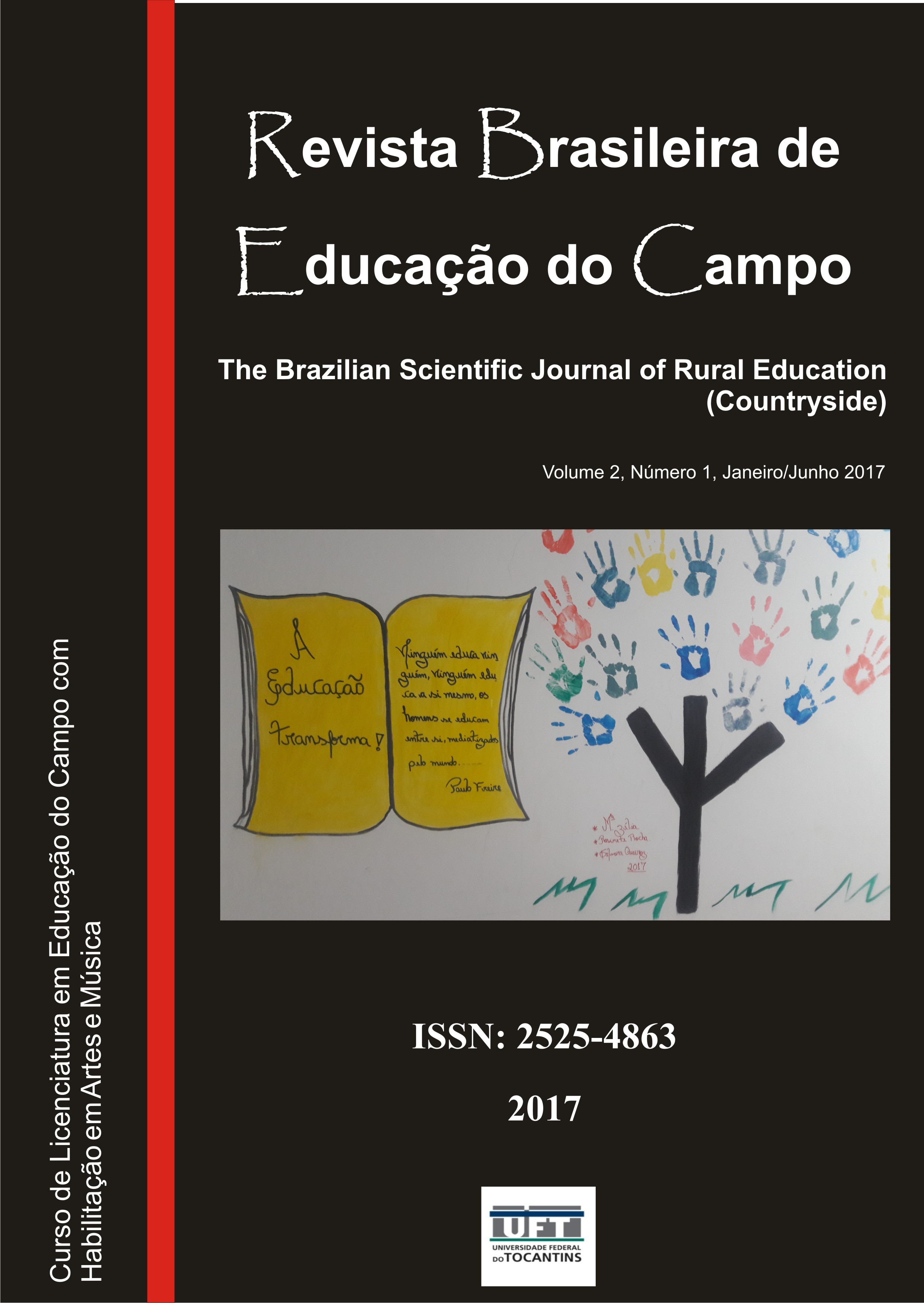Living on the countryside: the quotidian life of the rural youth of a city in Bahia
DOI:
https://doi.org/10.20873/uft.2525-4863.2017v2n1p106Abstract
ABSTRACT. The understanding of how the countryside youth has been theorized is quite relevant, because historically the school educational institutions assume that Brazilian youth come from spaces where sociability practices, gender relations, life projects and many other dimensions are homogeneous and unique. Regarding the invisibility of the countryside youth, one can observe the preponderance of a stereotype based on an urban vision of youth, nullifying their life’s singularities. Hence, this article intends to present the perceptions of the youth about the places where they live, as well as the daily experiences lived by them in these social movement spaces. There were ten groups of discussion with male and female students, enrolled in the final years of middle school of an institution located in the countryside district of a city in Bahia. The result of the developed research points that the formulation of educational public policies must be articulated with a country and provincial project that recognizes the existence of the countryside as a place of life, work, culture and leisure.
Downloads
Literaturhinweise
Abramo, H. (1997). Considerações sobre a tematização social da juventude no Brasil. Revista Brasileira de Educação, 5(6), 25-36.
Abramovay, R. (2004). Dilemas e estratégias dos jovens rurais: ficar ou partir. Estudos Sociedade e Agricultura, 12, 236-271.
Bohnsack, R., & Weller, W. (2006). O método documentário e sua utilização em grupos de discussão. Educação em Foco, 11, 19-38.
Brandão, C. R. (1995). A partilha da vida. São Paulo: GEIC/Cabral.
Carneiro, M. (2005). Juventude rural: projetos e valores. In Abramo, H.; & Branco, P. (Orgs.), Retrato da juventude brasileira: análise de uma pesquisa nacional. (p. 243-261). São Paulo, SP: Editora Fundação Perseu Abramo.
Castro, E., & Carneiro, M. (2007). Juventude rural em perspectiva. Rio de Janeiro: Mauad X.
Dayrell, J. (2007). A escola ‘faz’ as juventudes? Educação e Sociedade, 28(100), 105-128.
Instituto Brasileiro de Geografia e Estatística - IBGE. Municípios brasileiros. Disponível em: <http://ibge.gov.br>. Acesso em: 4 abr. 2010.
Margulis, M. (2001). Juventud: una aproximación conceptual. In Burak, S. (Org). Adolescencia y juventud en América Latina. (p. 41-73). Costa Rica: LUR.
Pais, J. (2003b). Vida cotidiana: enigmas e revelações. São Paulo: Cortez.
Pais, J. (2003a). Culturas juvenis. Lisboa: Imprensa Nacional/Casa da Moeda.
Pereira, J. (2004). Entre campo e cidade: amizade e ruralidade segundo jovens de Nova Friburgo. Estudos Sociedade e Agricultura,12, 322-351.
Stropasolas, V. (2006). O mundo rural no horizonte dos jovens. Florianópolis: Editora da UFSC.
Veiga, J. (2003). Cidades imaginárias: o Brasil é menos urbano do que se calcula. Campinas, SP: Autores Associados.
Vieira, R. (2006). Tem jovem no campo! Tem jovem homem, tem jovem mulher. In Woortmann, E., & Menache, R.; Heredia, B.(Orgs.). Margarida Alves: coletânea sobre estudos rurais e gênero. (p. 195-214). Brasília: MDA, IICA.
Wanderley, M. (Coord.). (2006). Juventude rural: vida no campo e projetos para o futuro. Relatório de Pesquisa. Recife.
Weisheimer, N. (2005). Juventudes rurais: mapa de estudos recentes. Brasília: MDA/NEAD.
Weller, W. (2011). Minha voz é tudo o que eu tenho: manifestações juvenis em Berlin e São Paulo. Belo Horizonte: Editora UFMG.
Weller, W. (2010). Grupos de discussão: aportes teóricos e metodológicos. In Weller, W., & Pfaff, N. (Orgs.). Metodologias da pesquisa qualitativa em educação: teoria e prática. (p. 54-66). Rio de Janeiro: Vozes.
Weller, W. (2005). A contribuição de Karl Mannheim para a pesquisa qualitativa: aspectos teóricos e metodológicos. Sociologias, 13, 260-300.
Weller, W. (2006). Grupos de discussão na pesquisa com adolescentes e jovens: aportes teórico-metodológicos e análise de uma experiência com o método. Educação e Pesquisa, 32(2), 241-260.
Veröffentlicht
Zitationsvorschlag
Ausgabe
Rubrik
Lizenz
Creative Commons Attribution License
Creative Commons Attribution License
Proposal for Copyright Notice Creative Commons
1. Policy Proposal to Open Access Journals
Authors who publish with this journal agree to the following terms:
A. Authors retain copyright and grant the journal right of first publication with the work simultaneously licensed under the Creative Commons Attribution License that allows sharing the work with recognition of its initial publication in this journal.
B. Authors are able to take on additional contracts separately, non-exclusive distribution of the version of the paper published in this journal (ex .: publish in institutional repository or as a book), with an acknowledgment of its initial publication in this journal.
C. Authors are permitted and encouraged to post their work online (eg .: in institutional repositories or on their website) at any point before or during the editorial process, as it can lead to productive exchanges, as well as increase the impact and the citation of published work (See the Effect of Open Access).














